Diabulus in Musica Interview 2014
Diabulus in Musica Interview 2014
March 13, 2014 (via Skype)
Rebirth is PAINFUL -- more like standing at the crossroads of death, than a transcendent voyage of self-discovery. The Spanish symphonic metal band, Diabulus in Musica, found themselves at this crossroads in 2012, after the departure of their guitarist, bassist and drummer. Not surprisingly, the founding members, Zuberoa Aznárez and Gorka Elso, struggled with the decision whether to end the band or reform it. Thankfully for lovers of symphonic metal, Diabulus in Musica chose the path of rebirth, and their third studio album Argia was born out of the band’s internal crisis. Despite its tempestuous origin, Argia is neither a self-pitying dirge nor a shrill rant. Instead it is a beautiful slab of metal that is filled with warmth and passion.
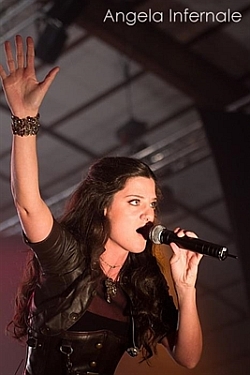
Sonic Cathedral’s Robin Stryker sat down with Zuberoa Aznárez (vocals) and Gorka Elso (keyboards) for a long Skype chat. Dive in for a behind-the-scenes look at the origins of Argia, Diabulus in Musica’s trepidation and recording their first Spanish song, music as a means of catharsis and preserving cultural treasures, and much more!
Sonic Cathedral: Zuberoa and Gorka, welcome to Sonic Cathedral! Early in 2013, Diabulus in Musica replaced their guitarist, bassist and drummer. Would you give us an introduction to the newest members of the DiM family?
Zuberoa: Yeah, sure. We don’t like to do castings and that kind of thing, so we first thought about people we already knew from our hometown. So we first thought about the drummer, whose name is David Carrica. He is a really great drummer, but there was a problem … he is playing in a very big band in Spain and South America, which is called Tierra Santa, so we were not sure because of the schedule of shows. We thought that maybe he is really busy with the band, and he is not able to join us. So we were worried about that, but we first asked if he would like to be a band member. Well, he really loves the band, so he from the first said: “Of course, I would love to be in the band!”
As for the problem with Tierra Santa (the other band), he told us that it was not really a problem for the moment because they were taking a break this year. So we thought “okay, let’s go!” Who knows what will happen next year or the following year, but for the moment, we REALLY wanted to have him, and we are very happy because we have him. <laughs> So he’s a really great, great drummer.
As for the guitarist and the bass player, we were not friends, but almost friends. I mean, we knew each other from …
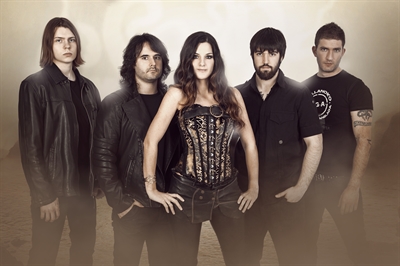
Gorka: … from the metal scene in Pamplona.
Zuberoa: So we first thought about asking them if they would like to join, and we thought: “Well okay, if they say no, we will have to start searching for new members, and maybe castings and that stuff.” But we preferred to come to the people we already know. It is very nice to have them because I think we fit really well together. Great guys, and great musicians as well!
Sonic Cathedral: Your new guitarist, Alexey Kolygin, has another band (Allowance), where he is a growler. Does he do any growling on Argia?
Zuberoa: He is not growling in this album. It was something that we had in mind, but the problem was that we were writing the songs when they joined us. They joined us because we had some shows, and we needed to have new additions as soon as possible. So we asked him so fast to join. But when they joined, we were writing the new stuff, so they couldn’t really compose anything for the new album, apart from two or three riffs (no more than that). I would say that we didn’t have the time to prepare the grunts with him. That is why Gorka recorded everything.
But it’s actually something we have in mind, and he will probably do some of this too because Adrián [our former guitarist] used to make growls as well. During live shows, Gorka and Adrián always shared the parts of the grunting, so maybe live he will do the same. It will be Alexey who sings also the Adrián growling parts.
Sonic Cathedral: The Wanderer, which was your 2012 release, was a concept album. Is Argia a concept album, or is it more like Secrets where each song is free-standing?
Zuberoa: It is a mix between both albums. <laughs> It is not a collection of songs as was Secrets; it isn’t a concept album either. There is not a full story behind [the songs], but there is something in common in this album. It is not a story, but it is an idea. Because of this happening -- that the guys left the band -- from there, it started to grow something inside me: many different feelings, many different ideas about human beings and about human behaviors. Well, ideas about many things that started to appear in my mind.
And we also had a crisis where we didn’t know if we were going to continue or not with the band. That was a really, really hard moment for us, but Gorka and I decided to go on. Actually, we are the founders, we are the core of the band, and we are the main composers as well. So we thought: “We have made Diabulus in Musica. We have to continue with this; we cannot just leave now.” That is why the album is called Argia. “Argia” in our native language (in Basque) means “light” and it also means “clear”. We saw in our path again the light to continue to go on with music, and also the clearness. We started to see things much more clearly than before, and we knew that this is our way -- that we definitely have to continue making music. Because it’s our LIFE, we cannot stop making it, so that is the general concept of Argia.
These two last years, we had a very hard time, but we also had encouragement. We have found the strength to continue, and have understood many things, so that’s the concept in general of the album. Also there are many songs that are totally about different topics, but all related with this internal crisis. I always say that this album is like a therapy for me, like a catarsis … I don’t know if in English you can say this … it is like an album made to heal my feelings and to heal myself as a person.
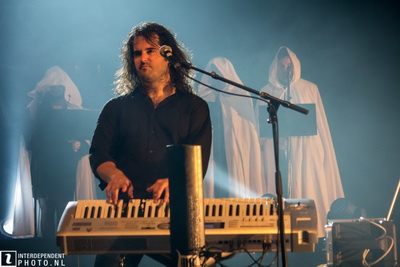
Sonic Cathedral: When you are writing cathartic lyrics to heal yourself, is it difficult to cloak your feelings in poetic language, where the underlying events are not obvious to the listener?
Zuberoa: Hmmm, I like to use metaphorical language always. When I start writing, I always start with the music because of a feeling inside, but I am very bad with words. I don’t know how to explain the things I am feeling. I am really, really like a free-spirit, but I don’t know how to communicate very well with people. I am a very shy person too, but I have a very rich internal world, I would say. My mind is filled with strange thoughts, and I am always thinking about every small detail in life. So, I always start from the music because, for me, music is the general language for everybody. Even if you don’t understand the lyrics, you can easily understand the feeling that music transmits to you.
So I always start with music, and then I try to put words to the feeling. But if I don’t have a clear idea about how to express my feelings in words, I need to express those feelings in metaphors. There are very abstract ideas, so you cannot express those ideas in normal words. Also because, when someone is listening to the lyrics or reading the lyrics, I always like that they can take the lyrics into their own experience, and they can understand the meaning of the lyrics into their personal lives. I don’t want for the message to be so clear that they can’t feel their own feelings, reading the lyrics. Yeah, it’s difficult, but it is always the music that is taking me to the idea, and then to the metaphor to interpret the idea I have inside. <laughs> I don’t know if you understood my English.
Sonic Cathedral: <laughs> Yes, absolutely! Well, like tech-savvy 21st Century musicians, you collaborated with Ad Sluijter (ex Epica), using Skype to work on some of the songs. (His guitar riffs also light up “From the Embers”.) How did creating music together with Skype work out for you?
Zuberoa: It’s good! It is the benefit of technology.
Gorka: At the beginning, it was strange. When you are working on music, you don’t have the physical contact, and it’s strange. <laughs> But I think that, well, it’s something that we have to become used to. The evolution of the technology lets us do these kinds of things. It was a great experience, yeah.
Zuberoa: Besides, we are friends since many years now, so you know, it’s easier to do it. We had already sent him three songs when we started to write, and had already talked by email about the songs and everything. So it was not so strange, but it’s really nice! “Oh, you are in Holland, and I am in Spain, and we can write together a riff!” It is cool; it’s really COOL. Well, the same with the singers and with the special guests. We didn’t meet to record, so it’s really cool that you can record at home, and send the files to another person on the other side of Europe or wherever.
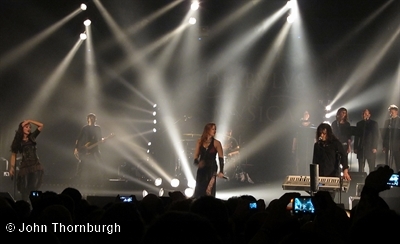
Sonic Cathedral: Since I very much like symphonies, one of the things that stood out was that you brought in guest musicians for the woodwinds. Actually, I’m struggling to think of another metal album with a guest oboist. Why did you choose the oboe and clarinet in particular to record live for Argia?
Zuberoa: We always use the full orchestra, but as you can imagine, you have to have millions of Euros to record with a full orchestra and a full choir. The first time with Secrets, we tried to record real strings, but the rest of the orchestra was samples. There was not such a big difference between the real strings and the samples, and it took really a lot of time, so we decided to do everything with samples [for The Wanderer]. But I’m a flautist, and I HATE the flute samples because they are really horrible. <laughs> I have tried many of them and we have searched in many libraries, but it’s AWFUL. When you play an instrument, you can distinguish the difference. So I said: “Okay, I will record the flute parts, and the rest we can use samples.” And the result was really good; the result of the flutes in The Wanderer is more brilliant.
Gorka: More natural.
Zuberoa: The sound shines more. So we thought: “This time, why don’t we try to record the woodwind instruments naturally because they have such a special sound?” For me, the oboe is the most beautiful instrument in the world. It is really, really sweet and soft; it just expresses so much feeling. I love it! And we have a friend [Iñigo Osés] who is a very good oboe player, and we asked him if he could record some parts. He plays in an orchestra with another girl [Zuriñe Mayo] who plays the clarinet, and he told us: “Oh, I can tell her to play as well.” Okay, that’s cool!
So I recorded the flute, and they recorded the oboe and clarinet parts. The sound is really, really different. I think that the stringed instruments in the sample libraries sound much more real than the woodwind instruments. So that’s why we decided to try. And as we had the possibility here in our home city -- and we didn’t need to have any special studio because we record everything at home -- it was a really nice experience, and we think it is better to do it this way.
Gorka: Actually, if you want to achieve real orchestra strings, you need the full orchestra. You cannot achieve that sound by recording the violins four or five times. It is not that way that it works. But since a real orchestra only has one or two oboes and two or three clarinets …
Zuberoa: … and two flutes, it was easier to make it sound real. As Gorka said, if you record strings, you have many takes. But with only two instruments or maybe three, it is not REAL, so it’s better to do it with samples. But with the woodwinds, it worked out fine.
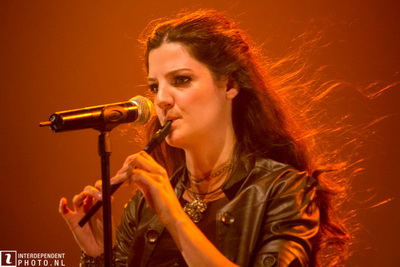
Sonic Cathedral: My colleague Doctor T will be very excited to hear that Diabulus in Musica recorded their first song with Spanish lyrics, which features guest vocals by the lovely Ailyn Giménez of Sirenia. Can you tell us more about the track “Furia de Libertad”?
Zuberoa: Since Diabulus in Musica started, we never thought to record anything in Spanish. <laughs> It is a stupid idea because we’re from Spain ... I don’t know why I thought symphonic metal should sound horrible [with Spanish lyrics]. <Gorka laughs> We were so used to listening to music in English that I couldn’t imagine to sing in Spanish. But nevertheless, I used Basque and Latin as well, so it made no sense not to use [Spanish too]. But we didn’t do it.
With the second album, I started to think about doing it, but I didn’t find a place for a song in Spanish on that album because of the story. We had already thought about all of the songs, so for me, it made no sense to make a song in Spanish for The Wanderer. But I definitely thought that, with the following album, I will try to do it as an experiment because I had never written in Spanish. When we wrote that song, it was strange because, for me, the music really had a Spanish flavor, so I thought “THIS is the song”. .
I thought about Ailyn because we knew each other from before (from Facebook only); we hadn’t met in person. It was last year at Metal Female Voices, when we sang together our song in the Eve’s Apple, then I proposed to her: “Well, would you like to sing together with us a song in Spanish?” And she said: “Yeah, sure!” She really likes the band, and I was very, very happy to have her. She is a very lovely person and so humble, and we became friends very fast. I was really excited to have her singing with me! I mean, Spanish is really special because we both are from Spain, and it was very special for me to have her.
About the meaning of the song, this song talks about the crisis in Spain -- the economic crisis, but also the political crisis and the crisis of values. I think that the crisis of values is the cause of the rest of the crises, because it all started because of the ambition of some people here. This song is dedicated to all those victims of the situation now in Spain. <sighs> It’s a really hard one.
Sonic Cathedral: You have another very special guest vocalist on Argia: Thomas Vikström (of Therion) who duets with you on “Encounter at Chronos’ Maze”. Honestly, that track sounds like something straight out of a musical. Would you tell me about that collaboration, please?
Gorka: When we wrote that song, in some way we tried to find that musical style. We realized that that song could fit in that genre, so in the beginning, we thought about a classical singer … a tenor or someone like that. But we thought that maybe it would be better to find a singer with a rock thing. Well, at the beginning, we couldn’t find a good singer for that, but we thought about Thomas Vikström, who is an amazing singer. We thought: “Whoa, if we ask him, he will fit perfectly for that song!”
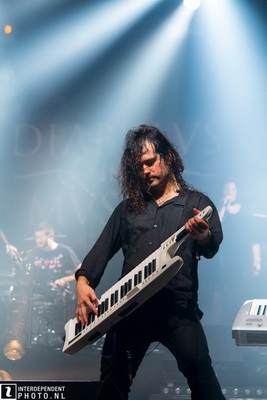
Zuberoa: We didn’t realize that at first. As Gorka said, we need someone with a very special background, and Thomas knows how to sing classical musical, knows how to sing musical theater, and knows how to sing heavy music. At the beginning, we didn’t realize there was a person who actually knew how to sing all those styles. The song started to do itself alone. Gorka started to write the verse, and then when I listened to the verse, I thought: “Oh, I’ve got the chorus!” Then I started to hear inside my mind the voices … I could hear the voices … and I thought: “We need a male singer, but he has to sing THIS way.”
I started to think, but I couldn’t find anyone in the metal scene. And then I said: “Ah Therion … Thomas is PERFECT.” <laughs> It was his voice I was hearing inside my mind. We didn’t have a contact with him because we have never met before, but we actually are friends with the guitar player for Therion, Christian, an Argentinian guy whom we met years ago here in Spain when he was playing some shows. Then I said: “Okay, I’m going to write him, just to ask if it would be possible to have Thomas’ contact [information].”
Well, Christian contacted Thomas, told him about our band, and told him that I was going to write him, and he gave me the email address. To be honest, I didn’t expect him to say “yes” because the first thought you have is: “Well, I’m sure that he doesn’t know who we are.” I don’t know. You always think that you are an unknown band maybe, and start to think about many bad things. But he answered very fast (the same day we sent the email), after I sent an email with a small demo of the song.
Gorka: With bad sound.
Zuberoa: <laughs> Yeah, a ROUGH demo of the song. But when he answered, I was so blown away because he told me that he really liked my voice, that it was an amazing song, and that he was looking forward to collaborating with us. We were so happy and so honored to have him. For me, it is really, really an honor to sing along with one of the best singers in the metal scene.
Gorka: He is very versatile.
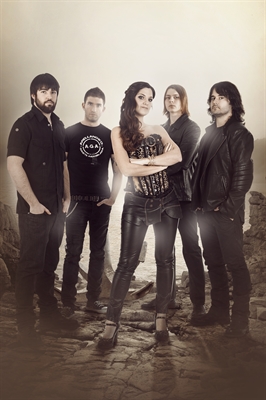
Sonic Cathedral: My next question doesn’t have anything to do with music, but is something that has been rattling around in my mind. Globalization has some very positive aspects, but at least here in the US, it also is killing regional cultures and accents. Is it also a struggle to preserve the Basque culture in Spain?
Zuberoa: Well, we have a very big problem here, and it’s a political one. Of course, we are Basque and feel Basque, but it’s really hard for the Spanish government to know because they don’t want to. They always think, if you are feeling Basque or talking Basque or living your culture, you are trying to separate the region from Spain into another country. Well, actually there is a political party here that wants independence, but for me, it has nothing to do with politics. I mean, we have a treasure here. Basque is one of the oldest languages in Europe, and there is only a small part of the population that are speaking this language because it was about to disappear. With the dictatorship here in Spain after the civil war, we had to suffer … how many years? … from ’36 until ’74.
Gorka: FORTY years.
Zuberoa: Around forty years of dictatorship, and this dictator Franco did not want to hear about any local language in Spain. Spain was ONE, and it had to be ONLY one … but without the respect of the cultures here. And it’s really a pity because Spain is a big country, and it’s very rich because we have so many different cultures here. This is rich for our country. It doesn’t mean that you don’t feel Spanish.
I can feel Spanish; I can feel Basque as well. One thing is not incompatible with the other. But for the government and for the political parties it is, and I cannot understand it. I will always defend culture, and actually, I’m a historian. I have studied archeology as well because of that, because I was really interested in ancient cultures. When you know that yours is one of the oldest, for me, it’s really a big treasure that we have to preserve. Forget about the other things, and forget about politics, and forget about terrorism. That has been the main problem that we have had here … there was a terrorist group fighting for independence. Of course, we are against all kinds of violence, but we don’t have to forget that the Spanish government also has been really violent towards the “different”. The “different” can be Basque, can be Catalonia, can be Galicia, or it can be any other region in Spain. .\
People don’t understand that we can be … I don’t know how to say this, but when you talk to someone from outside of Spain about Spain, they will always tell you something about bulls or flamenco. I have nothing against flamenco, but this is a culture in the south of Spain. The distance, between the south of Spain and where we live, is a big as the distance from where we live to Brussels.
Gorka: Yeah, it’s around 1200 kilometers [750 miles].
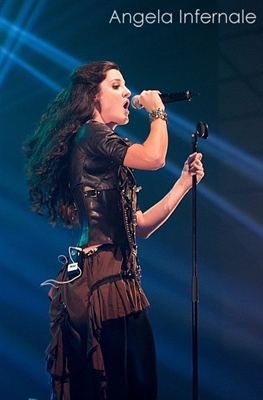
Zuberoa: So I cannot feel identified with a culture that is not mine. Of course, I will always respect ALL the cultures because I think they are our main treasure, and we have to preserve all of these things. But we cannot pretend that everyone in Spain is like that. We have to make the world know also that we are here. But what happens is that, when you are saying that you are Basque, they are automatically thinking about the problem of the terrorists, and it’s really hard for us.
Some years before now … maybe now, it’s not as before … but some years ago, I remember we had in the cars the [license plate] number that also had the territory where you belong. So when we traveled to Madrid or to the south of Spain, if someone saw that you were from the north, you could find your car broken. It was like this. Well, I’m talking about 20 years ago, and of course, not everybody is like this. But the media and some political parties are trying hard to talk bad about the north of Spain because of that problem. We want to fight all political manipulation, and just defend the culture, language, music, and all the beautiful things that all the cultures in the world have.
Sonic Cathedral: I think the Basque woven into the track “Maitagarri” is just beautiful. Final question before we wrap up, Diabulus in Musica was one of the first bands announced for this year’s Metal Female Voices Fest. What do you have planned for this year?
Zuberoa: <laughs> It is still too soon to talk about that. But we can promise that it will be a special show. We always try to do our best in that festival because we simply LOVE it. We love the people there, and we always have a wonderful time with all the fans. It is so special because you can be in touch with everybody. In the backstage and in the hotel, you are always sharing a glass of wine with the fans, the promoters, the bands, and everybody. It is really a special event.
In fact, it was the first festival to support Diabulus in Musica. We are really grateful that they gave us the chance to play in our first big festival outside Spain. It was wonderful, and we have had the opportunity to come back. We cannot describe it. We feeling always like we are inside a big family there! So for sure, we will do something special because I think it is the only place where we take a small choir with us. Also because the technical side is very good -- the lights are really good and the stage is really big -- it is awesome! We are starting to think now about the show. I can promise that we will do something SPECIAL.
Sonic Cathedral: Zuberoa and Gorka, thank you so much for talking with Sonic Cathedral today!
Gorka: Thank you.
Zuberoa: Thank you for your patience, and I’m sorry for the bad English. <laughs>
Many thanks to Jon Freeman at Freeman Promotions for setting up the interview! He is a true pro and always a pleasure to work with. .
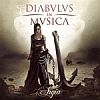
Check out Sonic Cathedral’s 2010 interview with Zuberoa and Gorka HERE.
Promotional photos by Stefan Heilemann
Diabulus in Musica official site
Diabulus in Musica on Facebook
